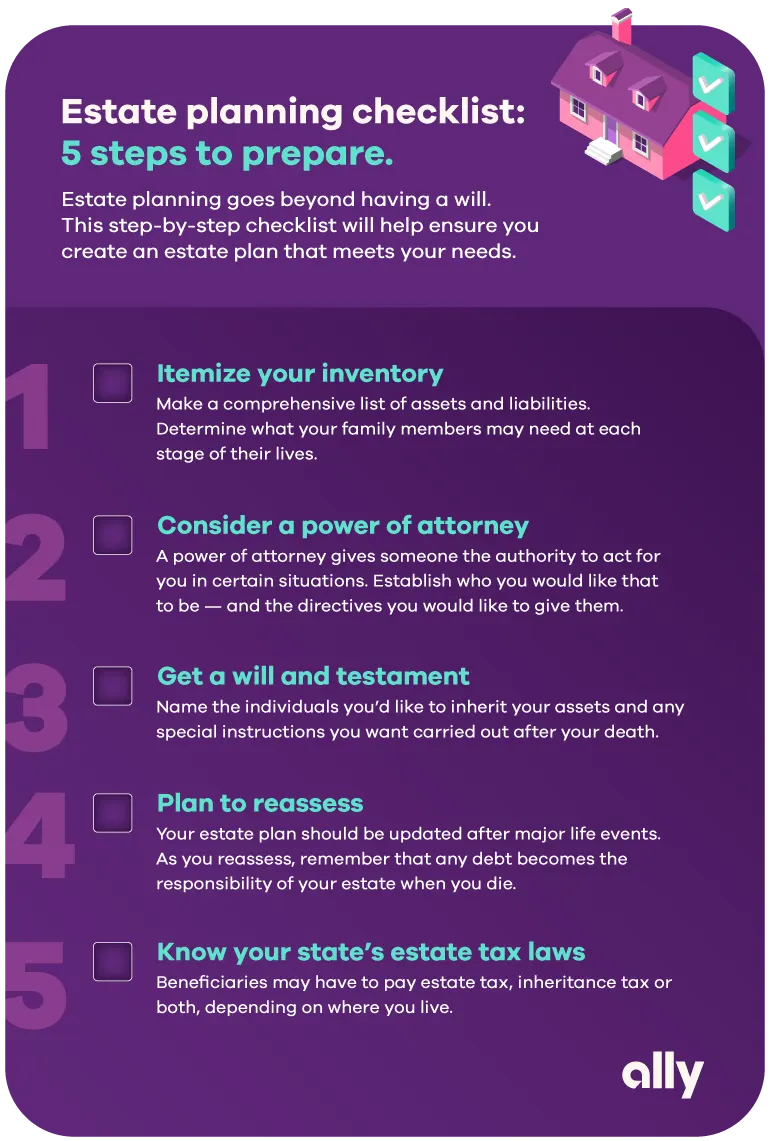Estate planning may feel less important than other parts of your financial plan, especially if you’re young — but it’s necessary to consider for your financial wellbeing and peace of mind, as well as for your loved ones.
Estate planning, defined
Estate planning is the legal process of arranging how your assets will be handled after your death or if you're unable to make critical decisions. Estate plans allow others to understand and follow your wishes, which can be especially important in situations like specifying a guardian for your children (but couples without kids can benefit, too).
Key components of estate planning
A complete estate plan includes:
A will describes how your assets should be distributed and usually names an executor or personal representative to administer the distribution. Your will can also include funeral instructions and appoint guardians of children until they become adults.
A trust allows you to grant ownership of property or assets to a trustee who will distribute that property to a beneficiary, either after your death or while still living
A durable power of attorney designates someone to take care of your affairs
A medical power of attorney has the authority to make major medical decisions for you when you cannot make them yourself
Benefits of estate planning
Estate planning allows you to protect your assets and ensure they end up where (and with whom) you want them to go. Developing a plan can also help reduce estate taxes and provide for your loved ones. It can help you minimize the probate process, which involves appointing an executor or personal representative who will administer your estate.
Documents for estate planning
A lawyer can help you determine which documents you may need to have before you get an estate plan in place, but they may include:
A net-worth statement, which lists your assets and any special gifts you would want to make, as well as any liabilities
A personal letter to articulate expressions of affection and personal values
Consider these important details to address in your documentation:
Titling and listing beneficiaries on certificates of deposit, money market and savings and checking accounts can smooth the transfer of these assets
Naming an executor or co-executors to administer your estate
Common misconceptions about estate planning
These frequent misunderstandings may be keeping you from starting a plan, so let’s clear up any uncertainty.
1. Estate planning is only for the very wealthy
Anyone who owns assets could benefit from some sort of estate plan. For example, if you want to leave your house to your child, it’s important to identify that desire.
2. Estate planning is only about distributing assets
Your will can outline your funerary wishes and your medical power of attorney; and a living will makes it more likely that your final wishes are upheld and your end-of-life plan is enforced.
3. Estate planning is a one-time task
Every three to five years, or anytime you experience a significant life change or milestone (such as starting a family, getting married or divorced, etc.), consider updating your estate plan.
Common questions about estate planning
Planning for the distribution of your estate can be an overwhelming process — let’s tackle some frequently asked questions.
How much does estate planning cost?
Attorneys may prepare a simple will or power of attorney for around $300, but more complex documents will incur an attorney’s hourly rate, which will depend on factors including their experience and location.
Anyone who owns assets could benefit from some sort of estate plan.
Can I do my own estate planning?
If you have modest assets in your own name and plan to leave them to a closest living relative, you could use an online platform. A lawyer can help you draw up the right type of will, name beneficiaries, prepare a durable power of attorney and create an advanced health care directive. However, it’s best to consult a trusted advisor as you develop your estate plan. These professionals can also help address the legal needs of LGBTQ+ families or non-traditional family structures.
When should I start estate planning?
As soon as you become a legal adult, it’s a good idea to consider an estate plan. Just remember to revisit your plan as your financial situation changes.
How to create an estate plan
Your estate plan is a personal document, so the details will vary widely. But consider these steps:

Never too early
Writing a will or trust can serve many functions, but these documents ultimately safeguard your wishes and relieve some stress for you and your family.
Next in the series




